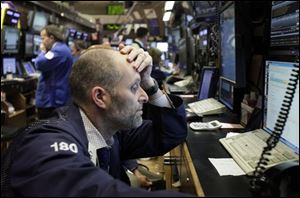
Stocks plunge on economic news, oil price swings
3/10/2011
Trader Jason Weisberg works in his booth on the floor of the New York Stock Exchange Thursday.
NEW YORK — Weak economic news from China, the U.S. and Spain combined with a slump in oil companies sent stocks sharply lower Thursday. The Dow Jones industrial average had its biggest one-day drop since August.
Investors were jarred when China reported a surprise trade deficit. China's exports fell in February as businesses closed for the weeklong Lunar New Year holiday, but imports of higher-priced oil and other goods jumped, widening the country's deficit to $7.3 billion.
Moody's downgraded Spain's debt, re-igniting fears about Europe's debt crisis. In the U.S., the government reported that new applications for unemployment benefits rose more than expected last week.
The Dow Jones industrial average fell 228.48 points, or 1.9 percent, to close at 11,984.61. McDonald's Corp. was the only stock in the Dow 30 that rose.
The Standard & Poor's 500 index fell 24.91, or 1.9 percent, to 1,295.11. The Dow and S&P 500 are still up 3 percent since the start of the year.
The Nasdaq composite fell 50.70, or 1.8 percent, to 2,701.02.
Thursday's drop in the Dow was the biggest since Aug. 11. The S&P had a larger fall recently, dropping 27.57 points on Feb. 22 as the uprising against Libyan leader Moammar Gadhafi gained strength.
News that forces loyal to Gadhafi were poised to recapture the strategic oil port of Ras Lanouf from opposition forces sent oil down in the morning. Crude bounced higher later in the day after Saudi Arabian police fired at protesters. Crude oil lost $1.68 to settle at $102.70 per barrel, below the high of nearly $107 a barrel it reached on Monday.
Stocks fell broadly, but energy companies were hit the hardest. Exxon Mobil Corp., the largest company in the world by market value, fell 3.6 percent. Chevron Corp. also fell 3 percent. Energy companies fell 3.6 percent, the most of any industry tracked by S&P.
Oil has been surging over the past few weeks because of the spreading protests in North Africa the Middle East. Libya produces less than 2 percent of the world's oil supply, investors have been worried that unrest will spread to major oil-producing countries like Saudi Arabia and disrupt the flow of crude.
Only a handful of S&P 500 companies rose. Starbucks Corp. rose 10 percent after cementing a deal with Green Mountain Coffee Roasters Inc. to sell drinks in machines made by Keurig. Netflix Inc. rose 3.6 percent.
Apart from several sharp swings in the last month, stocks have been rising nearly continuously since last August, when the Federal Reserve said it would take steps to stimulate the economy. Wednesday marked two years since stocks bottomed out at 12-year lows.
Quincy Krosby, chief market strategist at Prudential, said the market was shaken by the combination of unexpectedly weak economic news from China, the downgrade of Spain's debt and concerns that protests planned for Friday in Saudi Arabia could bring instability to the world's largest exporter of oil.
"The tone of the market has clearly changed," Krosby said. "The market trend had been to buy rather than sell and that bad news doesn't matter. The momentum is slowing."
The government reported before the market opened that new applications for unemployment benefits rose more than expected last week and the trade deficit jumped in January. New unemployment claims rose by 26,000, far more than the 12,000 analyst had expected. Applications fell to nearly a three-year low the previous week.
Investors moved money into relatively stable investments as stock prices fell. Treasury prices rose, sending the yield on the 10-year note down to 3.36 percent from 3.47 percent late Wednesday. An index measuring the dollar against other currencies rose 0.7 percent.